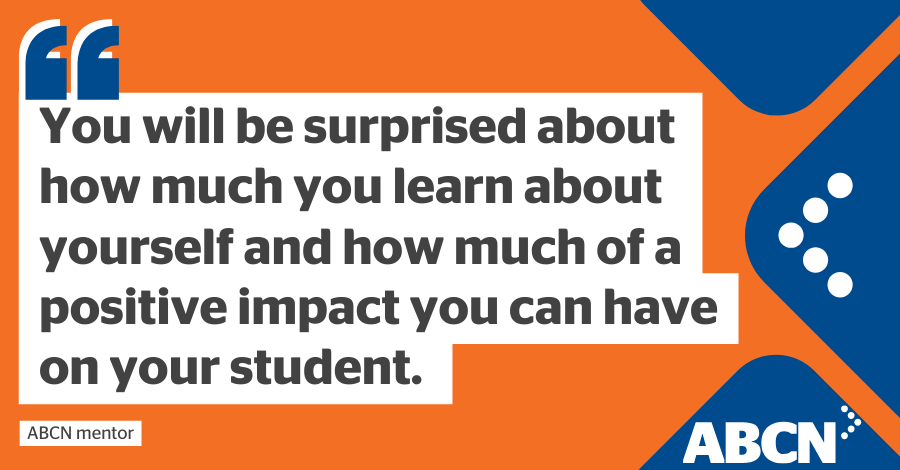Our many volunteers tell us over and over how rewarding the mentoring experience is and how grateful they are for the opportunity.
Here are some commonly asked questions posed by new mentors:
Do I need experience?
Absolutely not. Mentoring on an ABCN program does not require formal training, preparation or knowledge. Just by showing up you’re already halfway to changing a young person’s life. Your role is to act as a guide and role model – your input, thoughts, and experience will make the difference.
Do I need to prepare?
You don’t need to formally prepare but be ready to share your experiences, successes and failures as authentically as you can. You will be briefed before your session by one of our facilitators and the facilitator will guide you through the session. The week before each session, your program champion will send you a snapshot of what will be covered so you will be aware of what’s coming up.
How do I know what to do?
An ABCN facilitator will be your guide for the whole program and will explain every step of each session. Mentors are never left out on a limb – you’re not the focus and you won’t be in the spotlight.
Will I be on my own?
On a typical program you’ll be grouped with one or more colleagues and four or five students on a table. You will stay in these groups for the whole program.
What’s the time commitment?
This varies by program from a few hours to around 10 hours spread over many weeks. Some of our programs take place over three hours on one day only. Our multi-session programs require between one and two hours per week over a number of weeks. We ask that you commit to the whole program and that you are consistent in attending sessions.
A few more tips:
Here are some top tips we’ve collected from some of the thousands of volunteer mentors who participate in ABCN programs each year:
- Be a good listener – giving your student the space to talk about themselves will help them leap ahead in confidence (and also give you the time to gather your own thoughts!)
- Be vulnerable – don’t be afraid to tell your student about mistakes you have made and what you learned from them. Be prepared to talk about your failures more than your successes.
- Be a motivator – explain the simple concept of a comfort zone, and invite them to step out of theirs and into a learning zone.
- Be prepared – take the time to read the program introduction. Set a reminder beforehand, then put all work aside and enjoy the session.
- Be present – the sessions are short, so give yourself and your student the focus and time you both deserve to get the most out of it.
- Be open – think back to your past and share some experiences and stories of your first jobs – good, bad or ugly!
- Be authentic – your honesty about your experiences will help the students relate to you.
- Be practical – share any advice, tips or skills that you learned early in your career.
- Be empathetic – try to remember who you were at their age. Did you have goals? If not, did you wish you did? If you did, have they changed? Are there choices that you learned from?
- Be brave – what have you got to lose? Consider an ABCN mentoring program an adventure and throw yourself in. Go with the process and have fun.
For more information, speak to the ABCN program champion at your company.
More resources:
- Listening and caring were key tips relayed by four ABCN principals at a webinar for future mentors – Read Now
- How mentoring benefits the mentor, too – Read Now
- Mentoring Masterclass – Watch Now
